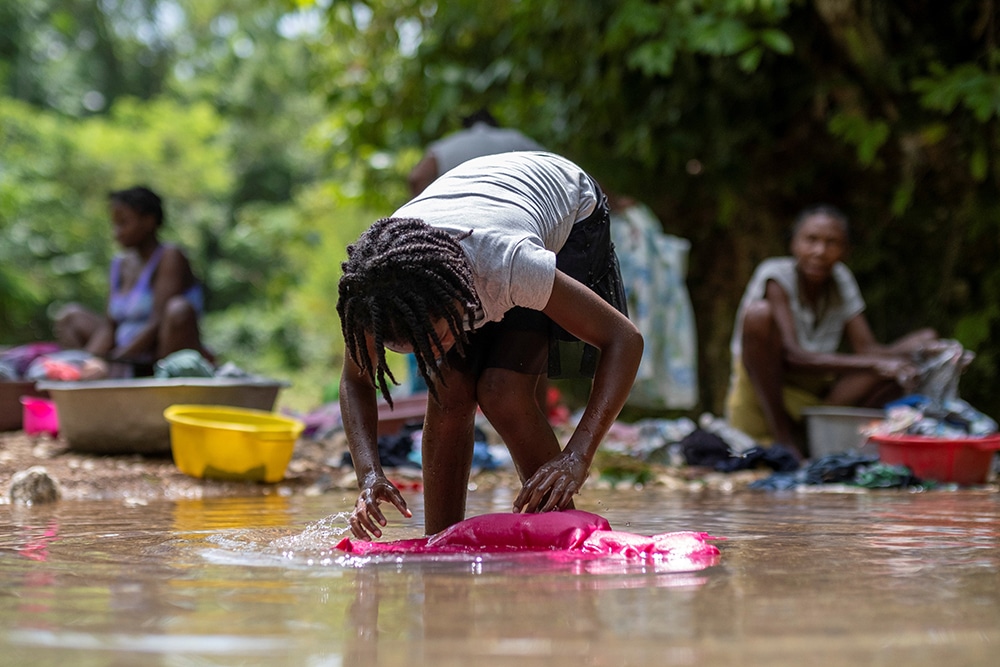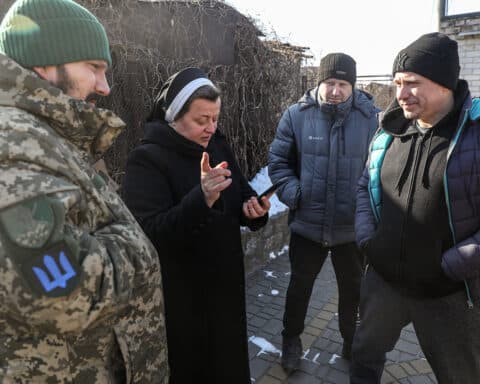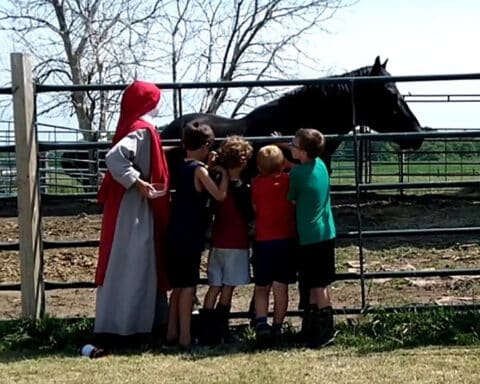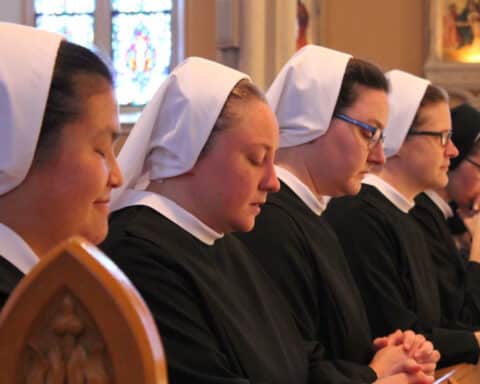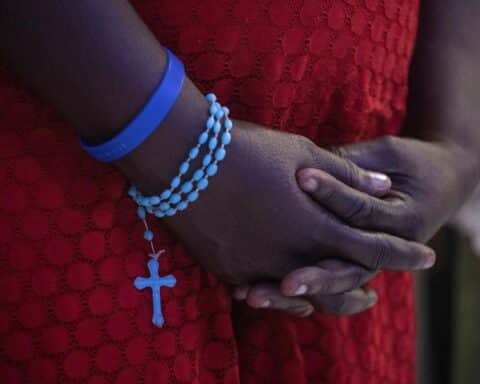It was an odd Saturday morning at the Felician Mission in Jacmel, Haiti. Sister Marilyn Marie Minter heard a cow mooing loudly, dogs were barking, goats bleated and birds were chirping more than usual. “It was weird,” she said.
Saturdays at the convent are free days for the four sisters to take time for themselves. Sister Marilyn was finishing her prayers when her chair started shaking. It was 8:29 a.m. on Aug. 14. Sister Mary Inga Borko felt the floor moving.
“I quickly realized that it was an earthquake,” she said. “I knew that if we didn’t get out of this house, it could fall on us. I ran to tell everyone to get out immediately.”
Outside, the women heard people in the city screaming and shouting, but there was no significant damage around them. Back inside, 15 minutes later, they found messages on social media: A deadly earthquake had hit Les Cayes, which was 80 miles away. Later, tolls would count more than 130,000 houses damaged or destroyed, more than 2,000 deaths and more than 12,000 injured.
Near Les Cayes, 20 died when St. Famille du Toirac Church collapsed during a service. The Immaculate Conception Church of Les Anglais fell, killing 17 people age 24 and younger.
“A church in Les Cayes was having a baptism, and we saw photos of these dead children in their white outfits,” Sister Marilyn said. “It makes your heart cry.”
An aftershock rocked their area at 2 p.m., and another hit at 11 p.m. Between those tremors, Bishop Glandas Marie Erick Toussaint of the Diocese of Jacmel, and the director of Caritas, which responds to international crises, announced that they needed medicine, towels, clothing and more.
The sisters packed everything they had in their clinic, knowing that they’d replenish supplies when they returned to the provincial motherhouse in Beaver Falls, Pennsylvania, north of Pittsburgh. The journey had already been planned for Aug. 18.
While the sisters are back in Pennsylvania, they’re raising money to buy enough supplies to fill a cargo container to send back, including medical and school supplies, hygiene products, bedding, baby items and more. Laptop computers or tablets, Sister Marilyn said, “would be a God-send.”
Those everyday needs are even greater since the earthquake. Add to that the devastation of the COVID-19 pandemic, for which vaccinations and medical care are lacking, the political unrest from the assassination of President Jovenel Moise on July 7, and the destruction from Tropical Storm Grace that hit Haiti on Aug. 17.
The August earthquake had a magnitude of 7.2. But because of its location, it did less damage than the one on Jan. 12, 2010, which had a magnitude of 7.0 with 52 aftershocks. Most of the damage then was in Port-au-Prince and Jacmel, with more than 250,000 residences collapsed. Some estimates put the death toll at more than 300,000 people.
It was that 2010 earthquake that brought Sister Marilyn and Sister Mary Inga to Haiti when the provincial minister, Sister Mary Christopher Moore, challenged the Felicians to respond.
“We went there six months after the earthquake, and it was still horrific,” Sister Marilyn said. “There were people living in tents and on the streets. There were people who were naked because they didn’t have clothes. There was no clean water, no running water and no sewage system. And where we are today, some still don’t have that. I realized that you just don’t go there and work for a week or two or three and come home without doing something about it. We needed to go back.”
There was so much to do that they didn’t know where to start.
“One night I asked, ‘God, why did you send me here?'” Sister Marilyn said. “I was reading from Luke, the explanation of the loaves and fishes where Jesus says to the disciples, ‘feed them yourselves.’ I realized that to feed them myself meant the ministry of presence. That’s when we started to walk the streets. I play guitar, and I sing, and I know a little French, and it was the presence. There’s something real here, something that we have to do.”
The sisters connected with the Diocese of Jacmel to discern what was important, where they should do their work.
“The needs came to us,” Sister Mary Inga said. “There were five boys who were converts who came to us, and we had to find something for them to eat. We started feeding them granola bars because that’s all we had, but that was enough. So we established a kitchen and cooked rice and beans to feed the children. Soon, we asked children why they were on the streets when they should have been in school.”
The youngsters didn’t have uniforms or shoes, nor money for tuition. The sisters found donors to sponsor them through school, and some went to college.
“They needed a place to do homework, because their homes don’t have electricity and tables to sit down,” Sister Mary Inga said. “So we built a simple classroom outside with electricity, and the kids started to come to us to do their homework.”
The diocese told the sisters that the people needed help with medical care.
“Then God opened another door for us,” Sister Marilyn said.
Felicians at the province in Lavonia, Michigan, donated a mobile van that’s staffed by two doctors, a nurse, a pharmacist and a driver, all of them Haitian. That’s part of the sisters’ goals: to bring empowerment, sustainability and independence with Haitians helping each other. The clinic charges a very small fee to preserve the patients’ dignity.
“We go to 28 places in the mountains where people have never received any kind of medical services,” Sister Marilyn said. “They would have to take a motorcycle to the nearest clinic or hospital, or go to a voodoo doctor, or they would just die.”
They bought land from the diocese to build a convent for four sisters. Two Felicians from Poland, Sister Mary Izajasza Rojek and Sister Mary Julitta Kurek, joined them. The mission has a pharmacy for the clinic, a volunteer house and an activity center. The computer lab, along with student sponsorship and tutoring, have a positive impact on a nation with 60 percent illiteracy in rural areas.
Sponsored students pay it forward by helping each other and giving back to the community. Medical school student Tchery Louis, 25, has been sponsored for nine years. He helps with the mobile medical unit and is now with other students and medical personnel responding to the aftermath of the earthquake.
“We keep in touch with him every day,” Sister Marilyn said.
With Sister Mary Izajasza’s background in sewing, the sisters started a sewing school to teach job skills that lead to self-sufficiency. Products may be sold online in the future. Plans for a bakery, The House of Bread, were put on hold during current crises.
The sisters minister to the spiritual needs of the people with Mass at their convent chapel and religious education in preparation for the sacraments. And there are plenty of prayers.
“When we came here, we saw the importance of showing the people the presence of God and of hope,” Sister Marilyn said.
Donations can be sent to Felician Sisters of North America, 871 Mercer Road, Beaver Falls, PA 15010, noting “Haiti” in the memo. Donations are also being accepted online at feliciansistersna.org.
Maryann Gogniat Eidemiller writes from Pennsylvania.

